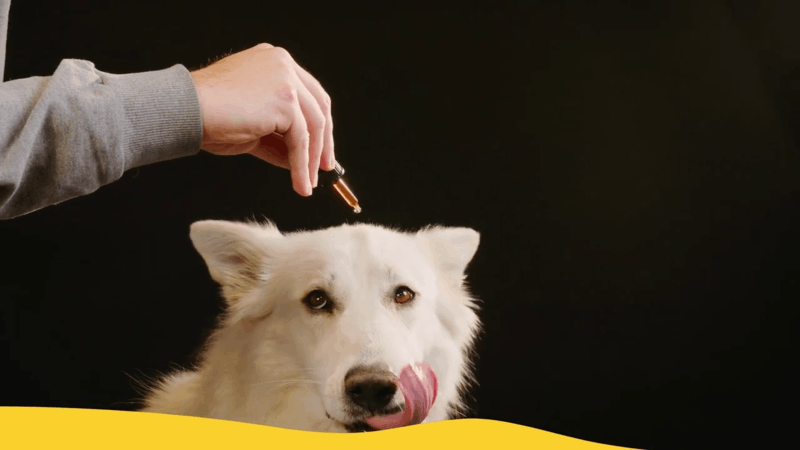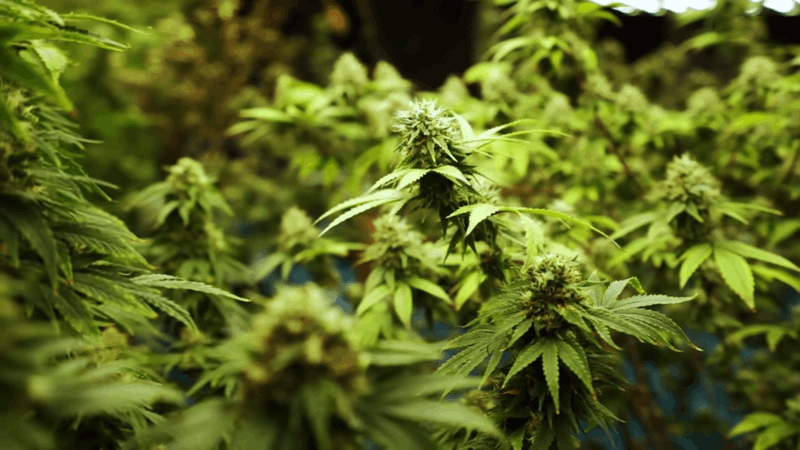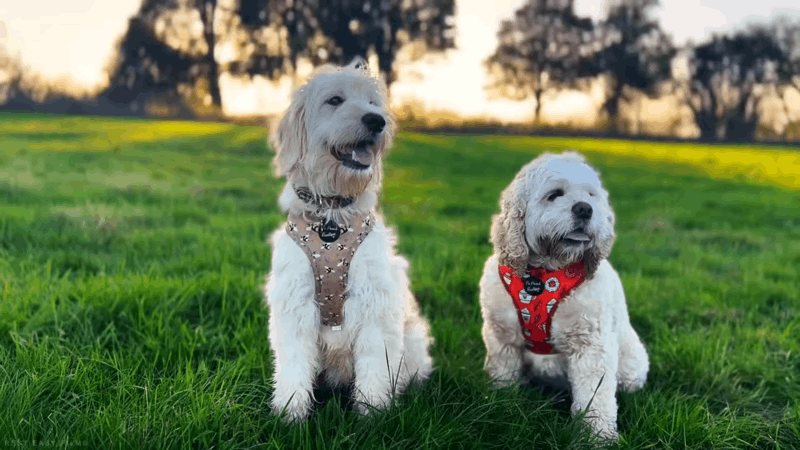No products in the cart.
The potential benefits of daily CBD for dogs have captured significant attention as a natural remedy for enhancing their overall well-being and addressing various health conditions. As pet owners seek alternative approaches to support their furry companions’ health, daily dog CBD administration has become a popular option. However, understanding the appropriate dosing, potential benefits, and considerations for its safe use is essential.
In this blog, we’ll go into the topic of daily CBD for dogs, looking at its possible benefits and dosing issues. We will also discover the reasons why it’s so important to speak with a veterinarian before introducing CBD into your dog’s daily healthcare regimen.
How Often Can I Give My Dog CBD?

The frequency with which you can give your dog CBD (cannabidiol) depends on several factors, including the specific product you’re using, your dog’s size, and the reason for administering it. To determine the appropriate dosage and frequency for our furry friends, it’s important to consult with a veterinarian before starting any CBD regimen.
CBD can be given to dogs once or twice a day and monitoring your dog’s response and adjusting the dosage as needed is so essential. Regular check-ins with your vet will help ensure that your furry friend receives the right amount of CBD to address their specific health needs safely and effectively. Remember, responsible use of CBD and professional guidance are vital to maintaining your dog’s well-being.
The Factors that Determine the Appropriate CBD Dosage for Dogs
Determining the appropriate CBD dosage for dogs involves considering various factors, as each dog’s needs can differ significantly. Here are some key factors that play a role in determining the right CBD dosage
- Weight and size: Larger dogs typically require higher CBD doses than smaller ones due to variations in metabolism and body mass. A general rule of thumb is that larger dogs need higher milligram amounts of CBD.
- Condition being treated: The specific health condition or issue you’re addressing with CBD can influence the dosage.
- CBD product potency: Different CBD products come in various potencies or concentrations. You must know the CBD content per serving of the product you’re using to calculate the appropriate dosage accurately.
- CBD administration method: CBD can be administered to dogs in various forms, such as tinctures, treats, capsules, or topicals. Each method may have different bioavailability, affecting how much CBD is absorbed by the body.
- Individual sensitivity: Dogs can have varying sensitivities to CBD, so it’s essential to start with a lower dose and gradually increase if needed while observing your dog’s response.
- Medical history: Pre-existing health conditions or medications your dog is taking may interact with CBD, affecting the appropriate dosage. Consulting with a veterinarian is crucial to avoid any potential interactions.
- Severity of symptoms: The severity of your dog’s symptoms or condition may warrant a higher or more frequent dosage to achieve the desired therapeutic effect.
- Quality of CBD product: The potency and purity can affect the effectiveness of the dosage so please ensure to use a high-quality CBD product from a reputable manufacturer.
Always remember to consult with a veterinarian before starting your dog on a CBD regimen. They can provide personalized recommendations and help you determine the appropriate dosage for your beloved canine companions.
Is There a Standard CBD Oil Dosage for Different Dog Breeds?
There is no standard CBD oil dosage for different dog breeds. The appropriate CBD dosage for dogs varies depending on many factors. It’s crucial to remember that every dog is unique, and CBD can not be suitable for all of dogs
CBD dosages for dogs are typically given in milligrams (mg) of CBD per kilogram (kg) of body weight. Pet owners should start with a low dosage and gradually increase it until they achieve the desired result. Most CBD products for pets come with dosage guidelines on their packaging, but these are often just general starting points and may not be specific to certain breeds.
To determine the right CBD dosage for your dog, consulting with a veterinarian is necessary. They can consider your dog’s specific needs and health condition to provide personalized dosing recommendations. To create a secure and efficient CBD regimen, a veterinarian will consider your dog’s breed, weight, medical history, and any drugs they may be on.
Daily CBD for Dogs

Daily CBD for dogs can be beneficial for managing various health conditions and promoting overall well-being. When given to dogs in the right amounts, CBD may aid with pain relief, inflammation reduction, anxiety and stress reduction. Additionally, CBD’s potential anti-seizure properties have shown promise in managing epilepsy and other neurological issues. Regular CBD use may also support joint health and mobility in aging dogs.
However, it’s crucial to consult with a veterinarian before starting daily CBD for dogs. The vet can determine the right dosage, monitor your pet’s response, and ensure that CBD won’t interact with any existing medications. Responsible and informed use of CBD can be an excellent addition to your dog’s daily healthcare routine.
Benefits of Daily CBD for Dogs
Daily CBD use for dogs has been associated with various potential benefits, although it’s essential to note that individual responses may vary. Some potential benefits of giving dogs CBD on a daily basis include
- Pain management: CBD’s anti-inflammatory properties may help alleviate pain associated with conditions like arthritis, joint issues, or injuries, leading to improved mobility and comfort.
- Anxiety and stress relief: daily CBD for dogs has shown promise in reducing anxiety and stress, helping to calm nervous or anxious pets in stressful situations or with separation anxiety.
- Seizure management: Some dogs may benefit from CBD’s anticonvulsant characteristics to help manage seizures and epilepsy, possibly lowering the frequency and intensity of seizures.
- Support for nervous system health: CBD’s interactions with the endocannabinoid system may promote neurological health and function in dogs, potentially benefiting dogs with neurological conditions or age-related cognitive decline.
- Improved appetite and nausea relief: CBD can stimulate appetite in dogs that have reduced interest in eating due to illness or other reasons. In some situations, nausea and vomiting in dogs may be alleviated.
- Skin and coat health: CBD’s anti-inflammatory effects might help soothe skin irritations, reduce itching, and promote healthier skin and coat in dogs with allergies or dermatological issues.
- Enhanced sleep quality: With the usage of daily CBD for dogs, some companions may have improved sleep patterns that result in more restful sleep and better general health.
- Support for the immune system: CBD’s potential immunomodulatory properties may support the immune system, helping dogs to better fight off infections and illnesses.
- Anti-tumor effects: daily CBD for dogs is suggested that it may have anti-tumor effects, potentially aiding in the management of cancer in our furry friends, however, more research is necessary.
- Reduced aggression and behavioral issues: CBD’s calming effects may help reduce aggressive behavior or other behavioral issues in some dogs.
Please remember that CBD is not a cure-all, and results may vary based on the individual dog and the specific health condition being addressed. Always consult with a veterinarian before starting your dog on a daily CBD regimen to ensure proper dosing and to rule out any potential interactions with other medications or health concerns. Responsible and informed use of CBD, along with professional guidance, can maximize its potential benefits for your furry companion.
Striking the Balance: Daily vs. Occasional CBD Oil for Dogs
Striking the right balance between daily and occasional CBD oil use for dogs involves carefully considering your pet’s specific needs and health conditions. Here are some factors to help you make an informed decision
Daily CBD oil
- Chronic conditions: For dogs with chronic issues like arthritis, anxiety, or epilepsy, daily CBD may provide consistent relief and long-term management.
- Preventive support: Daily use can act proactively, potentially preventing the escalation of certain health problems and supporting overall wellness.
- Age-related concerns: Senior dogs dealing with age-related challenges might benefit from daily CBD for dogs to support joint health and cognitive function.
Occasional CBD oil:
- Acute situations: For situational problems like anxiety during travel or loud noises, occasional CBD use can provide relief when needed.
- Cost-effectiveness: If your dog’s health issues are mild or infrequent, occasional CBD use might be more cost-effective compared to a daily regimen.
- Lower risk of side effects: Using CBD on an as-needed basis may reduce the likelihood of tolerance or side effects associated with daily use.
Finding the balance:
- Consult your veterinarian: Before starting any CBD regimen, consult with your veterinarian to understand your dog’s specific health needs, appropriate dosage, and potential interactions with medications.
- Start with occasional use: If your dog’s condition is situational or mild, begin with occasional CBD use to assess its effectiveness before considering daily use.
- Monitor your dog’s response: Keep a close eye on how your dog responds to CBD, whether used daily or occasionally. Note any changes in behavior, symptoms, or adverse effects.
- Adjust dosage as needed: If you choose daily CBD for dogs, start with a low dosage and gradually increase it until you find the minimum effective dose. For occasional use, have the appropriate dosage ready for specific situations.
- Combine with other approaches: CBD is not a substitute for regular veterinary care. Combine CBD use with other appropriate therapies, nutrition, exercise, and environmental enrichment for holistic well-being.
- Regular check-ins with your vet: Regularly communicate with your veterinarian about your dog’s progress and any changes in their health to ensure the chosen CBD regimen remains suitable.
Remember that each dog is unique, and there is no one-size-fits-all strategy to CBD use. To give the best possible care for your cherished friend, you must carefully assess your dog’s specific needs, pay close attention, and collaborate with your veterinarian.
Should CBD Oil Be Given on a Fixed Schedule or As Needed for Dogs?

Whether to give CBD oil to dogs on a fixed schedule or as needed depends on the specific health condition and individual needs of the dog. For chronic issues like arthritis, anxiety, or epilepsy, a fixed schedule of daily CBD for dogs may provide consistent relief and long-term management. This approach is especially beneficial for senior dogs or those with ongoing health concerns.
On the other hand, for situational problems like anxiety during travel or loud noises, giving CBD oil as needed can offer relief when specific events trigger stress. In such cases, occasional use might be more cost-effective and reduce the risk of developing tolerance to CBD. The decision should be made in consultation with a veterinarian, who can assess the dog’s condition and provide personalized recommendations for the most suitable CBD oil dosing approach.
Conclusion
Daily CBD for dogs can be a valuable addition to their healthcare routine, offering numerous potential benefits. However, it is essential to approach CBD use responsibly and under the guidance of a veterinarian. Finding the right dosage and a suitable CBD product is crucial for ensuring your dog’s safety and maximizing the potential benefits. You can give your beloved pet the best care and enable them to live a happier, healthier life by using CBD sensibly and under expert guidance.
Hello, I am Hazel Bennett, an experienced copywriter specializing in the fascinating topic of CBD for dogs. With a passion for pet wellness and extensive knowledge of CBD’s potential benefits, I am here to provide you with informative and engaging content.



